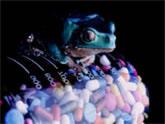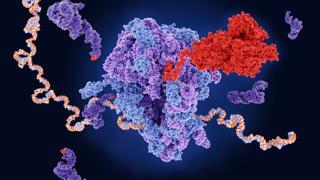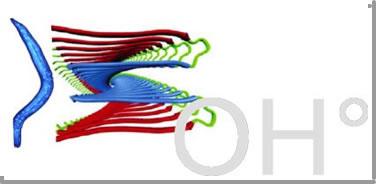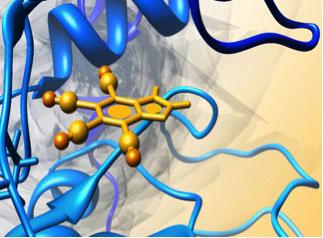
M2 - Biochemistry & Molecular Biology pathway
Biochemistry is a discipline that makes it possible to describe and understand – at the molecular, cellular, tissue and organismal levels – the fundamental mechanisms of living organisms under normal or pathological conditions, and how to intervene in their functioning. It is also an essential tool for tackling integrative disciplines such as cell biology, immunology, development, microbiology, neurology, genetics and cancerology.
Biochemistry is a discipline that makes it possible to describe and understand – at the molecular, cellular, tissue and organismal levels – the fundamental mechanisms of living organisms under normal or pathological conditions, and how to intervene in their functioning. It is also an essential tool for tackling integrative disciplines such as cell biology, immunology, development, microbiology, neurology, genetics and cancerology.
The aim of biochemistry and molecular biology teaching in the programme is to train biochemists to master the concepts and tools needed to utilise recent advances in the field of biochemistry (molecular biology, evolution and biodiversity, structural and functional genomics, structural biology, proteomics, pharmacology, biotechnologies) and areas at the interface of physics and chemistry. This is a wide-ranging course covering the structures, action mechanisms and evolution of living organisms at the molecular and supramolecular levels. The design of molecules intended for pharmacology or therapeutics and the development of innovative strategies in the field of biotechnology is a powerful unifying theme of the 'Biochemistry & Molecular Biology' course.
The course takes place over two years (M1 and M2) after the bachelor's degree. During the master's course, students will have to choose a number of teaching units that will determine their scientific and professional orientations.
Prerequisite skills (obtained during the Bachelor's degree in Life Sciences) will be required for enrolment in M1.
The subjects
Students will be oriented towards the "Biochemistry & Molecular Biology" pathway during M1 by choosing the courses they wish to study. Enrolment in an M2 subject will be considered after an interview at the end of M1. Only a limited number of students can be enrolled in M2 subjects.
RNA Biochemistry & Genetics - H. BECKER
(shared with the 'Genetics and Epigenetics' pathway)
Mots clés : Mondes ARN ; Expression des gènes ; ARN régulateurs ; ARN interférence ; Ribozymes ; ARNomique ; Nouvelles méthodologies de l'ARN et modélisations ; Interactions ARN/ADN/protéines ; Evolution moléculaire de l'ARN ; Applications thérapeutiques et médicales

Source : © Getty - JUAN GAERTNER/SCIENCE PHOTO LIBRARY
Aim of the course
The field of RNA is undergoing rapid (r)evolution, with the recent discovery of a multitude of new types of RNA (small and long non-coding RNAs, circular RNAs) and a huge number of chemical modifications on these RNAs, regulating their fate and functions (giving rise to the concept of epitranscriptomics, by analogy with epigenetics).
RNA plays an essential role in gene expression, through rRNAs, tRNAs and mRNA translation, but also through the very large number of genetic and epigenetic regulations carried out by non-coding RNAs. It should also be remembered that RNA plays an important role in maintaining the genome. Dysfunctions in these regulations lie at the heart of many pathologies (cancers, cardiovascular and neurodevelopmental diseases).
Recent events have reminded us that RNA can also be an infectious molecule, being the basic element of retroviral genomes (Covid-19, HIV, etc.). RNA can also be a therapeutic molecule, through the use of CRISPR, interfering RNA or aptamers to correct genetic defects or to target certain cancer cells for better destruction.
The aim of the BGA subject is to train high-level specialists capable of exploring biological processes involving RNA. To this end, our training programme is developing a wide range of study methods and concepts relating to RNA, at the interface of biochemistry/molecular biology and genetics (epitranscriptomics, structure-function relationship of RNA, RNA-protein and RNA-RNA interactions, RNA and epigenetic processes, complexity of splicing mechanisms, control of gene expression, RNA and evolution).
A one-day symposium on 'Multiple aspects of RNA' (in English), with numerous experts from the world of RNA, is an integral part of this course.
Workforce
12 to 20 students
Educational organisation
The specialisation course 'Biochemistry & RNA Genetics' (MU5BM823, 12 ECTS) consists of a common core (60 h) taken by all students enrolled in the subject. At the end of this core curriculum, students following the "Biochemistry & Molecular Biology" pathway will specialise further by taking the "Biochemistry & Molecular Biology of RNA" option (60 h), while students following the "Genetics" pathway will take the Pasteur course "Multiple roles of RNA: RNAomics" (60 h).
The project unit (MU5BM091, 6 ECTS) consists of a presentation of the internship project in front of a jury of biochemists, geneticists and geneticists.
The scientific analysis unit (MU5BM051, 6 ECTS) consists of presenting scientific themes supported by the analysis of scientific articles proposed by the lecturers and/or teacher-researchers involved in the courses and conferences.
The introductory UE (6 ECTS) will be chosen from those offered by Sorbonne Université or other higher education establishments. It should be noted that the Pasteur course "Multiple roles of RNA: RNAomics" (MU5BM817, 6ECTS) can be taken as an introductory course by students enrolled in this subject via the "Biochemistry & Molecular Biology" pathway.
The "Specialisation internship" UE (MU5BMSO6, 30 ECTS) requires students to find an internship in a research laboratory before the end of September. The choice of laboratory and placement topic is made in consultation with the teaching staff.
Topics covered
- Regulation of gene expression: non-coding RNAs, regulatory RNAs, splicing, intronic polyadenylation, epigenetics. - Protein/RNA interactions: structure/function studies, structural biochemistry, cryo-electron microscopy, spectroscopy, biological NMR. - Transcriptome and epitranscriptomics: next-generation sequencing (RNA-seq), cellular transcripts, RNAomics. Diversity and functions of modified nucleotides. - Degradation, stability and localisation of RNAs. - Medical, therapeutic and biotechnological applications. RNAs as regulators of biological processes. Dysfunctions and pathologies, biomarker RNAs, drug design. - Circular RNAs - Ribozymes / Telomeres. - Viral RNA: viroids, HIV-RNA, viral translation, RNA vesicles, interfering RNA. - Evolution - Phylogeny: bioinformatics analyses, origins of living molecules, modelling.
Student careers
This subject is essentially research-oriented, with many students continuing on to doctoral studies. Thesis topics are in the fields of life and health, chemistry and medicine, both in the public sector and in the pharmaceutical and/or biotechnology industries. Other students choose to go straight into working life as research engineers, technical sales staff, clinical research associates or secondary school teachers.
Contacts
Head of teaching
Pedagogical assistant
Molecules and therapeutic targets - C. EL AMRI
This subject is common to the 'Biochemistry & Molecular Biology' course at Sorbonne University and the 'Mechanisms of Life and the Environment' course at the Muséum national d'Histoire naturelle (MNHN). The MCT subject benefits from the complementary skills of teacher-researchers at Sorbonne University and the MNHN in the fields of molecular pharmacology, structural and functional biology, and the chemistry and biochemistry of natural substances.
Training objectives
Diverse areas of study:
- molecules of therapeutic interest: from natural substances to therapeutic proteins and nucleic acids
- targets in different disease contexts
- Outline the general approach to the validation of a therapeutic target
- Outline the different strategies and methods for identifying molecules and studying therapeutic targets
- Raise awareness of natural substances, isolation strategies and valorisation
- Provide an overview of therapeutic research in the pharmaceutical industry
Keywords
therapeutic molecules, natural substances, protein targets, drug design, therapeutic chemistry, molecular pharmacology, gene expression modulation, gene therapy
Cohort
15 to 20 students
Educational presentation
Thanks to its multidisciplinary nature, this M2 offers a wide range of training at the interface between biology and chemistry. Various themes are developed during the course:
- Different molecular structures of natural substances (small organic molecules, peptides with original structures, etc.) in relation to their biosynthesis pathways and biological activities (antimicrobial, antiviral, anticancer, antimalarial, etc.).);
- Use of natural substances and toxins for therapeutic and biotechnological purposes;
- Strategies for validating therapeutic targets as diverse as those involved in infectious diseases, cancer and neurodegenerative diseases;
- Traditional and innovative methods for analysing this structural diversity (nuclear magnetic resonance and mass spectrometry, metabolomics, genomic approaches for the discovery of new compounds);
- Notions of general pharmacology and medicinal chemistry, approaches based on screening of chemical libraries, raising awareness of the concept of chemical libraries, approaches based on rational design of molecules of therapeutic interest (enzyme inhibitors, inhibitors of protein-protein interfaces, protein-nucleic acid interfaces, etc.), current strategies for vectoring molecules into the body.
Molecular mechanisms of invasion of the host by the pathogen and identification of therapeutic targets (case of HIV and the Plasmodium parasite), mechanisms of drug resistance, particularly in infectiology and cancerology, search for therapeutic targets using high-throughput structural genomics methods, with examples from the Mycobacterium tuberculosis Consortium; New strategies in gene and cell therapy based on recent knowledge of the properties of nucleic acids (RNA interference, antisense oligonucleotides) and stem cells (regenerative medicine), Awareness of research into molecules of therapeutic interest in the context of the pharmaceutical industry,
The multidisciplinary nature of the teaching and placements should enable students to adapt to the various professional environments they are likely to encounter during their careers.
Admission requirements
This course is designed for M1 students in biochemistry, molecular and cellular biology, chemistry, physical or biological chemistry, doctors, pharmacists and veterinary surgeons, and engineers from the Grandes Ecoles specialising in life sciences and chemistry.
Speakers and partnerships
Our lecturers come from the academic world (Universities, CNRS, INSERM), the Institut Pasteur, the CEA and industry (pharmaceutical industries). Our industrial partners (teaching and/or internships) include: GlaxoSmithKline, Sanofi-Aventis, Roche, etc.
Diversity of themes and student outcomes
This subject is more research-oriented, with most students obtaining a doctoral grant. Thesis topics are diverse: natural substances, structural biology, regulation of gene expression, microbiology, virology, cancer, biotechnological innovation, etc. Some students choose to enter the workforce: research and development in the pharmaceutical industry or clinical research, or secondary teaching.
Teaching schedule
Teaching in this subject area is grouped together from mid-September to the end of December and takes place at the MNHN.
Mid-September to mid-November: Theoretical UE (UE MU5BM104), full-time courses and lectures; examination at the end of November.
UE MU5BM051 (Bibliographic analyses), two presentations analysing articles based on a selection of publications covering the three major themes of the subject: chemistry and biochemistry of natural substances, therapeutic targets and regulation of expression by nucleic acids/gene therapy. These presentations will take place at the beginning of November and the end of December.
UE MU5BM091 (Scientific project), bibliographical report and M2 internship project; submission of reports and oral examinations at the beginning of January.
Laboratory placement, from January to the end of June, oral presentation at the end of June.
Prerequisites
No pre-requisites are required to enrol in this subject, but the candidate's sensitivity to cross-disciplinary and multidisciplinary research would be a plus.
Contacts
Heads of teaching
- Pr. Chahrazade EL AMRI (Sorbonne Université) : chahrazade.el_amri @sorbonne-universite.fr
- Dr Séverine ZIRAH (MNHN, Paris): szirah@mnhn.fr
Pedagogical assistant
Structural and Functional Proteomics - A.LADRAM / J. HENRI
The sequencing of the complete genomes of many organisms has given rise to new concepts. Genomes have been succeeded by metanogenomes, transcriptomes, proteomes, peptidomes and metabolomes leading to the development of several disciplines known as structural, functional and chemical genomics and/or proteomics. The progress made over the last decade is also linked to the development of technologies initially created by the world of physics, chemistry and computing, whose applications in biology are now irreplaceable.
Educational presentation
Through these different concepts and study methods, this course retraces the scientific approach which leads, from the structure of a gene, to the determination of the structural and functional properties of a protein. The in vitro and in vivo approach will form the initial and main basis of the teaching. The in silico approach will conclude the theoretical training, as it utilises all the experimental knowledge acquired to determine directly from a coding sequence the tertiary structure of a protein, as well as its potential substrates and inhibitors. Although most of these prediction methods are still under development, they represent one of the greatest challenges facing biochemistry because of their pharmacological and medical consequences. Students graduating from this course will therefore have an 'interface' profile that is particularly attractive to both academic and industrial scientific organisations, start-ups and biotechs.
This training course covers these different concepts:
- In vitro and in vivo biomolecule analysis methods;
- the scientific approach which, based on the structure of a gene, determines the structural and functional properties of bioactive molecules (proteins, peptides, etc.);
- The in-silico approach to determining the tertiary structure of a protein, as well as its potential substrates and inhibitors, from a coding sequence;
- Rational design of functions with synthetic biology (synbio).
Audience
Holders of a first-year master's degree in biology, chemistry or physics or an equivalent qualification, but also doctors, pharmacists, veterinary surgeons or engineers wishing to extend their theoretical and practical knowledge of biochemistry and related fields of molecular biology, synthetic biology, or at the interface with physics and chemistry.
Careers
Fundamental, applied or clinical research in the fields of life and health, chemistry and the environment, as well as in the agri-food industry, whether in the public sector or in the pharmaceutical, cosmetics and agri-food industries, large groups, biotechs and starts-ups.
Organization
The PS2F theme offers two options, both of which are associated with a specialisation placement in a public or private research laboratory:
- "Structural, Synthetic and Functional Proteomics"
- "Protein structure and function - Institut Pasteur"
Contacts
Heads of teaching
Pedagogical assistant
Biology and pharmacology of ageing - I. PETROPOULOS

Aim of the course
This subject offers students high-level generalist training in the biology of ageing, covering molecular, cellular and tissue aspects as well as associated pathologies. The biology of aging is taught in an original manner that combines pharmacology, from molecular pharmacology to animal models, enabling the identification and development of active molecules in physiological ageing and age-related pathologies.
This course is designed for first-year master's students, as well as professionals from the pharmaceutical, cosmetics and agri-food industries, engineers, doctors and pharmacists (continuing education).
Cohort
15 to 20 students
Programme
Theoretical training
Specialisation UE "Biology and pharmacology of ageing" (UE MU5BM106, 12 ECTS) :
- Molecular and cellular mechanisms of ageing: theories; effects of oxidative stress on different cellular constituents (modifications of proteins, lipids, carbohydrates and DNA); maintenance of genome and proteome integrity via different detection and repair pathways, cell death; role of telomeric regions,
- ageing of integrated systems: extracellular matrix and skin support systems (photoageing, experimental models of artificial skin); nervous system, neurodegenerative pathologies, in particular Alzheimer's disease; atherosclerosis and arteriosclerosis; osteoarticular systems (osteoarthritis, osteoporosis),
- pharmacology: concepts of molecular pharmacology; pharmacokinetics, pharmacodynamics and drug metabolism; identification of therapeutic targets in ageing; pathological conformations of proteins; drug development (rational design, in silico
- screening, combinatorial chemistry, animal models, clinical trials, quality control),
- Bioinformatics workshop: modelling of biological phenomena; in silico
- studies of molecules of interest.
Scientific analysis UE (MU5BM051, 6 ECTS): specialised lectures by speakers from industry or academia combined with bibliographical seminars given by students.
Scientific project UE (MU5BM091, 6 ECTS): personal research project (presentation and written dissertation). Professional project: introduction to companies; personal and professional assessment.
Molecular Enzymology & Mechanics (MU5BM107, 6 ECTS) - Franco-Quebec course in advanced enzymology given simultaneously by videoconference between the Université de Montréal and Sorbonne Université: mechanistic enzymology (enzyme reaction mechanisms, enzyme activity, metabolic pathways); molecular enzymology (experimental approaches to enzymology, enzyme dynamics); cellular enzymology (protein engineering and biotechnologies, metabolomics and metabolic pathways in disease and ageing); pharmaceutical enzymology (drug discovery process, drug design). Lecturers at the Université de Montréal and the French universities Sorbonne Université, Paris-Sud and Toulouse III.
English UE (3 ECTS)
Practical training
Laboratory placement 30 ECTS
Maximum duration: six months starting in mid-January. Internship in a company (generally in research laboratories in the pharmaceutical, cosmetics or agri-food industries) or internship in an academic laboratory, in France or abroad. If necessary, the confidentiality of work contained in the dissertation and oral presentation can be ensured upon request.
Admission requirements
M1 or degree in medicine, pharmacy, veterinary medicine or engineering.
Stakeholders and partnership
Lecturers come from academia (universities, CNRS, INSERM), the CEA and industry (pharmaceutical and cosmetics industries). Our industrial partners (teaching
and/or internships) include
Christian Dior-LVMH, Danone, Expanscience, Galderma, GlaxoSmithKline (GSK), Ipsen-Beaufour, Hybrigenics, L'Oréal, MDS Pharma Sciences, Nestlé, Pfizer, Pierre Fabre, Sanofi-Aventis, Servier,...
Diversity of courses and student careers
After completing M2, students go on to study for a doctorate (30%) or enter the workforce (70%): research and development in the pharmaceutical and cosmetics fields (design engineer, research engineer, researcher); quality assurance, database management (project manager, data manager, consultant); marketing and sales; miscellaneous: public research, IT professions.
Teaching schedule
Theoretical training: September to December
Practical training: from January
Contacts
Pedagogical assistant
Marina Pavlopoulos
Département de formation : Master biologie moléculaire et cellulaire (BMC)
Faculté des Sciences et Ingénierie, Sorbonne Université
Campus Pierre et Marie Curie
Bâtiment C, 1er étage, pièce 106
4 place Jussieu, 75252 Paris cedex 05
Head of teaching
Pr. Chahrazade El Amri


